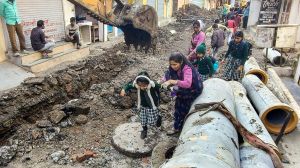Shock and remorse
We have found a number of instances of coverage that was not as rigorous as it should have been. In some cases, information that was controv...

We have found a number of instances of coverage that was not as rigorous as it should have been. In some cases, information that was controversial then, and seems questionable now, was insufficiently qualified or allowed to stand unchallenged.8221; So said the New York Times in a May 26 editorial, apologising for it and explaining why it went wrong on Iraq.
This is just one instance of the sort of heartburn that is going on in the Western media right now over its contribution to the build up that led to the American invasion of Iraq. In the UK, the BBC tacitly implied its culpability when it shifted from being a faithful supporter of the government8217;s war agenda to a strong critic with its 8220;sexed-up dossier8221; theory. But now far more embarrassing revelations are tumbling out for the media in general, about faulty editorial policies, deliberate misinformation, the sanitised presentation of visual evidence, British journalist Phillip Knightley maintains there was an 8216;unwritten agreement8217; that nothing too horrific should make it on to the screen or the front pages, misleading headlines, so on and so forth.
People who used to scouting around in other people8217;s closets are being forced to rummage through their own. And the findings are bleak enough for many to conclude with shame that had they done their job better they could have stopped President Bush8217;s seemingly unstoppable crusade before it led to real death and destruction in a faraway land.
In fact many believe the amount of introspection currently underway falls far short of the crime. Alexander Cockburn, for instance, writes of the NYT editorial: 8220;The modified climb-down is 1,100 words long. Here is no methodical review, such as the 7,200-word, unsparing scrutiny of Jayson Blair8216;s insignificant fabrications. Given the fact that the Times helped launch a war, now shaping up to be a world-historical disaster, proportionality surely demands something the length of the Times8217;s stories on the selling of another war, the Pentagon Papers.8221;
All of this is significant for us in India in a way that might seem difficult to comprehend given that we have no immediate plans to invade any other nation, with or without WMDs, and were such a plan to come to light, it would likely as not evoke howls of disbelief rather than war cries. The harm we can do is to ourselves. And therein lies the danger.
The media in the West, particularly the US, has become such a gigantic entity and its impact on the social psyche so enormous that a series of films have been made about it Natural Born Killers, To Die For, Almost Famous. It is not unusual to pick up a recent American features magazine and find almost every article related to a media phenomenon: from the small town murder elevated to national obsession by media attention to happenings inside a hip newspaper office. The media, in short, has become wallpaper.
In India we are on the verge of a similar explosion. The Indian media has expanded to an unprecedented size with the sort of freedom, financial muscle and chutzpah that would have seemed laughably unimaginable a couple of decades ago. From the neighbourhood tabloid to 24 hour news channels, there is potentially an eye open everywhere you go. The problem, and one that we should learn to be concerned about from the western experience, is that a quantitative boost does not bring about better quality. In fact it can do just the opposite.
It can lead to a lowering of standards, a crisis of integrity, a lack of responsibility and an amazing amount of triviality. But, worst and most unforgivably of all, it can lead to missing the real story.
We in India should know.
Despite the wall-to-wall coverage of the recent elections, with reporters fanning out to distant corners of the land and TV channels offering an unlimited amount of space for every conceivable detail and angle, the media failed to perceive the electorate8217;s disenchantment with the NDA alliance.
A blip. An uncommon error? Perhaps. Yet there has been little public discussion on what went wrong apart from a general admission of failure and a suggestion that journalists might have become too chummy with the ruling party to read the writing on the wall. For an entity that grows daily in power and influence this seems an indifferent post-mortem, at best. The media has a social responsibility it cannot and should not shirk. But even for its sheer survival it needs to be concerned. We can get it wrong once. Maybe twice. But in the end the media too is accountable. Just like everybody else.
- 01
- 02
- 03
- 04
- 05






























